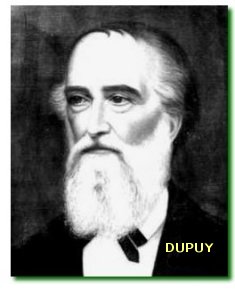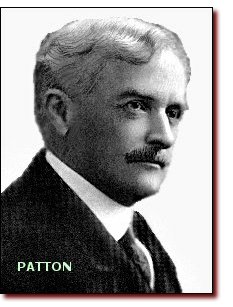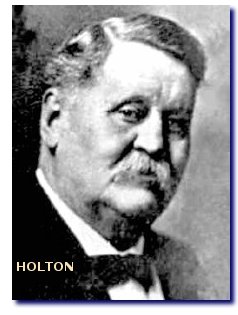Monday, November 4, 2006
Page 7
PERSPECTIVES (Column)
J.R. Dupuy: Most Obscure DA in Los Angeles County’s History
By ROGER M. GRACE
Sixteenth in a Series
JAMES R. DUPUY is probably the most obscure of the three dozen men who have headed the county’s prosecutorial agency. The various chronicles of Los Angeles history to which I’ve made repeated reference—those by Graves, Newmark, Bell, Robbins, and others—just don’t mention him. The thumbnail biography on the Los Angeles DA’s Office website relating to Dupuy reads, in its entirety:
“J. R. Dupuy (1887-1888). Scant historical sources are available for J. R. Dupuy. What records do remain indicate Dupuy followed Patton as district attorney in 1887 and served one year.”
It takes some digging, but what is found is that Dupuy was an able trial lawyer who could not hold onto the post he fortuitously acquired because he was a Democrat who ran for election in a year that belonged to the GOP. If you’ve been following this series, you might recall that the Democratic nomination for Los Angeles County offices at one time virtually assured victory, even after the Republican Party had sufficient strength nationally to gain election of presidential nominees. But now, the Democratic Party here—then referred to as “The Democracy”—was no longer in a domineering position; Los Angeles County, like the state, now had two solid parties which took turns at garnering the public’s favor.
And when Dupuy ran in 1888, partisan politics was, as never before, a major factor in the race for district attorney.
![]()
But let’s back up, and
see who
Dupuy was. On Aug. 2, 1831, he was born in Kentucky. The 1870 and 1880 censuses
show he was a lawyer in Kentucky living with his wife and three children.
censuses
show he was a lawyer in Kentucky living with his wife and three children.
A book reciting the history of the Dupuys indicates that the subject of our inquiry graduated from the Law School of Lexington, Ky. in June, 1857; practiced in St. Joseph, Mo., then in Shelbyville, Ky.; was elected in 1862 as prosecuting attorney for Kentucky’s Fifth Judicial Circuit, moving to Louisville; served as a member of the Louisville City Council for two years; and was elected as a judge of the Louisville City Court in 1878.
He journeyed to Los Angeles in 1884, and in January, 1887, became assistant district attorney here, under District Attorney George S. Patton, father of the World War II general with the same name. (The DA had been born in 1856 as “George William Patton” but, to honor his father, a Confederate colonel killed in battle, he adopted his name, “George Smith Patton,” in 1868, giving that same name to his son, born in 1885. Both the district attorney and the Army general have been referred to as “George S. Patton Jr.”)
![]()
The March 31, 1887 issue of the Los Angeles Times, on Page 1, shows that Dupuy acted for the prosecution at the preliminary hearing for Horace Bell, an attorney and the publisher of a local newspaper, the Porcupine, and author of the book, “Reminiscences of a Ranger.” Bell was charged with assault with a deadly weapon based on an encounter with a man who demanded that he stop mentioning him in his newspaper. The “deadly weapon” was a sword-cane—like that used by Gene Barry in the TV series, “Bat Masterson.”
The incident occurred at the corner of Spring Street (now differently configured) and Market Street (long non-existent). The spot is presently within the confines of the Clara Shortridge Foltz Criminal Courts Building.
The testimony of a witness, Anson Brunson, who had just resigned as a judge of the Superior Court, was that Bell struck his accoster, Gen. E. Bouton, on one of his arms with his cane, and that the jolt caused the bamboo scabbard to fall to the ground.
Dupuy’s job was to show that once the blade was bared, the cane had become a deadly weapon. He asked Bouton: “After the scabbard fell off, how was the blade used?” The response: “He kept it in the direction of me, as though prepared to thrust with it.”
The Times article says:
“Judge Dupuy…argued at some length as to the nature of the assault. The blow had been struck with a sword-cane—nobody denied that—and nobody will deny that a sword-cane is a deadly weapon. A concealed weapon is often the most dangerous of weapons.”
The defense lawyer—one ‘Big Bill’ Williams, as denominated in the news story—argued that there was a lack of evidence of an intent to use a deadly weapon. The judge agreed, declining to bind Bell over for trial.
![]()
Patton resigned on April 4,
1887, after only three-and-a-half months in office. Although his was the
shortest term of any man elected as DA, he does not compete with Dupuy for the
distinction of being the most obscure. Aside  from frequent references to him in
biographies of his son, the elder Patton attained prominence as the first mayor
of San Marino, the first city attorney of Pasadena, and an unsuccessful but
outspoken candidate for the House of Representatives and the U.S. Senate. He
was an adamant foe of extending the vote to women.
from frequent references to him in
biographies of his son, the elder Patton attained prominence as the first mayor
of San Marino, the first city attorney of Pasadena, and an unsuccessful but
outspoken candidate for the House of Representatives and the U.S. Senate. He
was an adamant foe of extending the vote to women.
On the day Patton resigned, Dupuy was appointed by the Board of Supervisors to take over the post. The Los Angeles Daily Herald’s issue of the following day contains this report:
Yesterday afternoon George S. Patton Esq. presented to the Board of Supervisors his resignation as District Attorney. Mr. Patton is not very robust, and during the campaign last fall he was ill for a considerable period. As was anticipated by his friends, the duties of the District Attorney’s office proved too onerous for him, and acting under the advice of his physicians he resigned his office. Of course the supervisors accepted the resignation. A largely signed petition was presented in behalf of J. R. Dupuy, Esq., who has been Assistant District Attorney since the commencement of Mr. Patton’s term, and Mr. Dupuy was readily appointed by the Board….
Mr. Dupuy, who has been appointed in the stead of Mr. Patton, is a gentleman of high legal attainments, and whose standing at the bar of Los Angeles is enviable. The Supervisors had the best interests of the county at heart when Mr. Dupuy was appointed.Politics did not enter into this appointment at all, but it is gratifying to note that Mr. Dupuy is a straightforward, consistent Democrat.
The Herald, as you might have inferred, was the city’s Democratic newspaper. The staunchly Republican Los Angeles Times had no such words of praise for Dupuy. By the way, the petition urging the appointment of Dupuy which the Herald’s article says was “largely signed” contained the signatures of 32 persons, according to the Times.
![]()
It is unlikely that
Dupuy
would have been hired by Patton had he not been a Democrat. While the office
is, today, a nonpartisan one, such was not so then. A district attorney was
chosen for a two-year term in a partisan election, and was not apt to bestow
favors on members of opposition parties.
and was not apt to bestow
favors on members of opposition parties.
Patton (a nephew and law partner of the Los Angeles Bar Assn.’s first president, Andrew Glassell) had run as a Democrat in 1886, defeating incumbent George Holton, the county’s first Republican district attorney. There were 5,509 votes for Patton, 5,265 for Holton, and 680 for J.H. Blanchard, the Prohibitionist candidate. Patton won in a Democratic year; Washington Bartlett, a Democrat, was elected governor (the only Jew, so far, to attain that post in California from its founding up to the present).
Ironically, the Democrat whom Holton beat in 1884 was Patton’s brother-in-law, Thomas B. Brown, the 1880-83 district attorney. Holton captured 5,188 votes, Brown got 4,798, and Bell, a member of the Greenback Party landed 544, with a Prohibitionist, F.X. Palmer, gaining 273. So partisan were these elections that an Oct. 28, 1886 report in the Los Angeles Times of a campaign speech by Holton reflects boasting by him of achievements and fiscal responsibility of the Republican Board of Supervisors, with no mention of anything he had done as district attorney.
![]()
While the Times did not give Dupuy a pat on the back when he was appointed, that’s not to say it never uttered words of praise of him. A news story on a murder trial, appearing on Oct. 11, 1888, observes:
“District Attorney James R. Dupuy conducted the prosecution, and asked questions in that impressive way he has….”
In those days, the district attorney of Los Angeles County did personally prosecute cases…as Hamilton Burger did, as late as the 1960s, on the Perry Mason TV show.
The DA’s personal courtroom chores included even relatively mundane matters. An Oct. 16, 1888, item in the Times recites Dupuy’s stance on a bail motion at an arraignment.
![]()
Dupuy wanted to stay in office and sought the Democratic nomination. The Los Angeles Times, on Aug. 20, 1888, reported that the county Democratic convention would be held the following day and that Dupuy had two challengers, one of whom was G.W. Glowner. The newspaper’s article on the convention, appearing two days later, says:
“Richard Dunnigan [a leading member of the bar] nominated J. R. Dupuy, incumbent, for District Attorney, and, on motion, nominations were closed. A vote was taken on the ayes and nayes. Division was called for, but the Chair decided it affirmatively. Mr. Dupuy came forward and made a long speech, and was choked down by the convention shouting, ‘Time.’”
Though it appeared that the nomination of Dupuy was said and done, one delegate, J.B. Holloway, protested the lack of fair play in the shutting down of nominations and proposing a different candidate, Glowner. There was a to do about reopening nominations, but Glowner came forth and withdrew in favor of Dupuy.
![]()
Dupuy’s opponent, Frank P. Kelly, is described in the Oct. 30, 1888 edition of the pro-Republican Los Angeles Express as “an active and energetic worker for the success of the Republican ticket.”
According to “An Illustrated History of Los Angeles County, California,” published in 1888, Kelly “went into the campaign with enthusiasm for the Republican cause, and it was remarked at the time, that although Frank P. Kelly was making a splendid canvass to the entire ticket, not one word ever dropped from his lips about his own candidacy, and when asked about it, remarked, ‘that he was a Republican, and would either win or lose with the ticket.’”
He won with it. “This was a Republican year!” a jubilant Los Angeles Times editorial of Nov. 7, 1888, declares. (Those words follow the one-sentence editorial outburst, “Good-by, Grover,” referring to the defeat of Democratic President Grover Cleveland by Republican Benjamin Harrison, and the proclamation: “The rascals must go!”)
The tally was 13,283 votes for Kelly, 10,653 for Dupuy, and 1,278 for Blanchard.
Dupuy did not join the ranks of the unemployed when the term to which he had succeeded expired in January, 1889. In 1888, he had gone into law partnership with Edward H. Bentley, with whom he had previously been associated; Dupuy & Bentley maintained a law office at 204 West Pico. There was no legal impediment then to DAs maintaining a law practice on the side.
![]()
Right on the heels of losing the DA’s race, Dupuy eyed the office of Los Angeles city attorney.
A Los Angeles Times article of Nov. 28, 1888 tells of what was anticipated at the Democratic meeting that afternoon to choose candidates for municipal posts:
“A hard fought fight will be made in today’s convention for the City Attorneyship. There are quite a number of candidates in the field, and all of them are working like beavers. J. R. Dupuy, the present district attorney, leads in the race. On his heels in hot pursuit are D. J. Lewis and G. W. Glowner.”
As it turned out, neither Dupuy nor Glowner was nominated; Lewis got the nod without opposition. Whatever happened behind the scenes is not known.
After Henry C. Dillon, a Democrat, gained office as district attorney in 1893, he hired Dupuy as a deputy. The next district attorney was John Donnell, a Republican, who tapped Holton as his chief deputy.
Copyright 2006, Metropolitan News Company